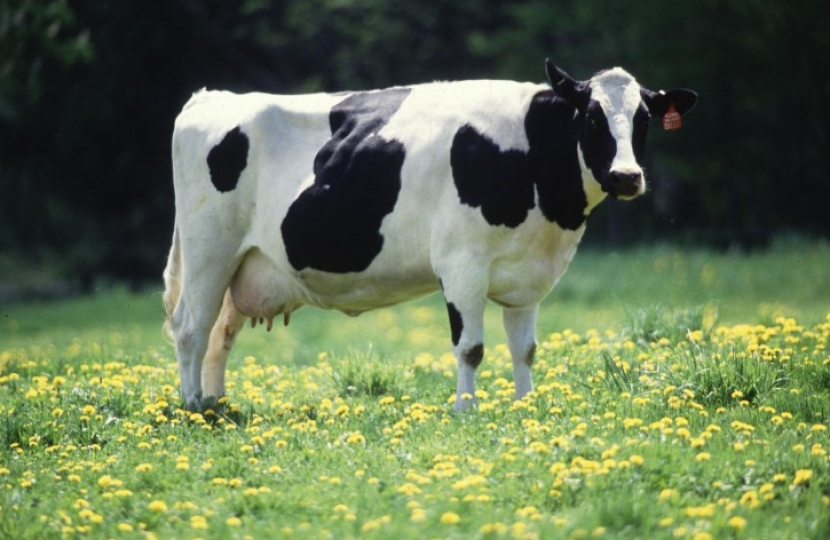
The Welsh Government’s current review of the Welsh dairy industry could enable evidence-based policy to address the very real concerns of hard-pressed farmers, argues Shadow Agriculture Minister Russell George.
Recent years have been tough for the agricultural industry. In 2012 alone, average farm income in Wales fell by 29%, followed by extreme winter weather in early 2013 and more recently changes in demand and challenges in the global economy, all putting pressure on farming businesses. The Welsh dairy sector, which accounts for 34% of agricultural production, has been affected as severely as any, but an independent review into the industry could, if it secures the backing of farmers and motivates the Welsh Government, turn fortunes around.
Of the 60 Assembly Members and 12 Welsh Labour Government Ministers or Deputies, few have experience of living in rural Wales or operating a small farm, but as a body remain responsible for making laws concerning the agricultural industry. Every single member of Carwyn Jones’ Cabinet represents an urban area, which makes engagement with the farming community so important so farmers’ voices are heard in the Assembly and their concerns acted upon. Political decision-making must be based on the evidence of the experiences of experts on the ground, the farmers who know better than anyone what actions need to be taken to support their industry.
The new Deputy Minister for Farming last year commissioned an independent review of the dairy industry, led by Andy Richardson, a member of the Welsh Government’s Dairy Task Force to make a series of recommendations by February 2015 to respond to the impact of falling milk prices. The Welsh Conservatives, the official opposition in the Assembly, welcome this timely review, which is a breath of fresh air after years of preaching to farmers, but what the dairy industry needs is swift action. We expect the Welsh Government to be swift in digesting this report and acting on its recommendations to begin to address the chronic problems facing dairy farmers.
We need a healthy supply chain, where farmers, processors and retailers of milk and cheese all receive a fair and sustainable price, which delivers quality and choice to consumers. This challenge also means addressing the lack of dairy processing facilities in Wales, where half of Welsh milk is sent to England to be processed. Unfortunately in recent years, there has been a tendency for supermarkets to drive down the cost of milk and indeed, farmgate milk prices have fallen by a quarter in recent months. While this might be popular with consumers in the short-term, the risk is that farmgate prices could be so low that dairy farmers are forced out of business, resulting in less choice for consumers and driving up prices for milk and other dairy products. 35 dairy producers left the industry between June and July 2014,while the number of dairy cows in Wales has fallen by 17% in the past 10 years. Supermarkets have a moral responsibility to their suppliers to price their products proportionately to fairly recognise the enormous contribution of dairy farmers in milk production, which will ensure sustainable supply.
After years of falling farm incomes and pressure on milk prices, we need a new agreement between all players in the dairy industry to ensure everyone receives a fair price for their role in milk production and sale. The Welsh Labour Government has a responsibility to work constructively with the UK Government and devolved governments in other UK nations as well as EU partners to promote the dairy industry and secure new markets. In recent months, dairy prices across the EU have been hit by a reduction in demand, partly caused by a Russian ban on Western food imports, introduced in August 2014. In 2013, Russia imported as much as 250,000 tonnes of cheese from the EU, but this ban opens up the opportunities for non-EU countries to secure a long-term market shares for their dairy firms, possibly at the long-term expense of suppliers in Wales.
The challenges in the Welsh dairy industry took on a new urgency in recent days when the financial problems at First Milk led to 400 Welsh dairy farmers being told that all future payments to them would be delayed by a fortnight. When you run a business where profit margins are wafer-thin, or even non-existent and your livelihood is under threat, a delay in payment of just a few days can put you out of business. This additional financial concern on top of the on-going supermarket price war over the cost of milk is pushing the Welsh dairy industry to its knees.
Consumers pay a premium for quality Welsh cheeses and other dairy products, but that reputation, which is so integral to Wales’ food offer to tourists, is at risk from unsustainable pricing. The Welsh Labour Government has a key role to play in restoring fairness to milk and dairy product pricing by working with unions, farmers and UK and EU partners. I hope Ministers will use the opportunity of a thorough expert engagement exercise to act to support Welsh dairy businesses. Effective communication between farmers, processors and retailers is crucial in ensuring fair and respectful relations, where everyone appreciates each other’s role in the supply chain. I hope that for the sake of our dairy industry, this opportunity to achieve that fair and sustainable relationship is grasped by the Welsh Government.
